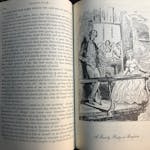Taking Laura Ingalls Wilder's name off a literature award is not banning her books. Her books are still there, to be read or ignored, to be enjoyed or not, to be admired or loathed.
Just as taking away the requirement for Duluth public school students to read "Huckleberry Finn" is not censorship. Mark Twain's book is still out there, still revered and hated, still seen as an American classic or an overrated book that is past its time.
I have to admit it saddened me at first when the Association for Library Service to Children (a division of the American Library Association) voted last weekend to change the name of the Laura Ingalls Wilder Award. It's now the Children's Literature Legacy Award. Her "legacy is complex," the association said in a press release, and "not universally embraced."
This is most certainly true.
I loved Wilder's books as a child, and I will always have a soft spot for them. But I also understand that many, many others don't feel that way: Her books are offensive to a whole lot of people. Yes, she was writing about life in pioneer days, and, yes, her books reflect the standards of the day. Her father put on blackface and danced in a minstrel show, and her mother vociferously hated Indians. Even though these things were true, it's alarming to read about them as though they are perfectly OK.
Standards change, the majority no longer holds the megaphone (a good thing) and other opinions are heard. Too many readers — children? adults? who cares? readers — were offended by incidents and feelings portrayed in Wilder's books.
Maybe naming an award — or a building or a park or a body of water — after a person is a bad idea, regardless: What human is pure enough to hold up to scrutiny over generations, over changing mores and morals and standards?
I would put the Laura Ingalls Wilder Award into the same category as Lake Calhoun: The Children's Literature Legacy Award is a better name, just as Bde Maka Ska is a better name. It's the original name of the lake, for one thing, and it's a name that references the land and the water, not a flawed human being who supported slavery.
When I read the "Little House" books as a child, Ma's hatred for Indians was very clear to me. Also clear was Laura's admiration for them — she admired their independence and their freedom. They lived in a way that she wished she could live.
But we are wiser now than we were in the 1950s and '60s, I hope, and Laura's view is also understood to be racist — stereotyping, romanticizing and patriarchal (especially the scene where she sees an Indian baby and wants her Pa to give it to her).
Just as with Mark Twain using the "N-word" when talking about Jim, the enslaved man whom Huck helps to free, the stories read differently now from when they were written. The books have not changed, but time and audiences have. Let's take writers' names off all awards. The award names might be more bland, but it would mean that in a few years' time we won't find that we are lauding supporters of slavery, like Mr. Calhoun, or celebrating writers who write from a perspective that is no longer defensible.
Laurie Hertzel is the Star Tribune senior editor for books. Email: books@startribune.com Twitter: @StribBooks. Facebook: www.facebook.com/startribunebooks





